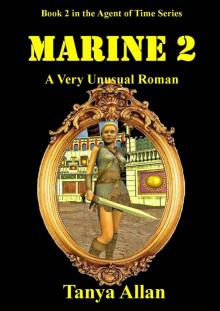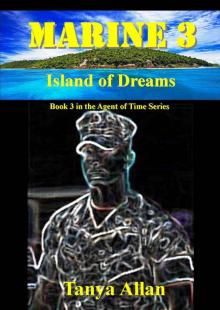- Home
- Tanya Allan
The Emerging Page 5
The Emerging Read online
Page 5
“Didn’t fancy staying on, then?”
“No, I’d done my bit. How about you?”
George smiled.
“I rose to a corporal once, but I got busted for a misunderstanding with a Redcap.”
“Ah, not the first, and you certainly weren’t the last. What happened?”
George shrugged.
“He thought I’d had too much to drink and I thought his dad had been to bed with a monkey.”
John laughed. It was like a breath of fresh air being with this old soldier. The years fell away, and both men relived the camaraderie they felt during those awful days.
“Ah, and he won?”
George grinned.
“Yeah, I suppose.”
“Right, now you’re here, you might as well look at the old girl,” John said, leading the way to the old tractor shed.
George looked at the elderly tractor, rubbing his chin and sucking air in through his teeth. John could see the indecision in the other man.
“Look, I’m not that bothered, I just want it gone. I’ve sold the farm and all the land and the new owners don’t want this as a sitting tenant. What’s it worth to you?”
George pulled up his sleeves and tinkered with the engine. John, like so many men of his class, sat back and admired a magician in action. A few minutes later, George inserted the starting handle and after half a dozen turns, the engine spluttered into some semblance of life. It sat there chugging, wheezing and belching dark fumes out of the exhaust pipe that sat like a locomotive’s steam funnel on top of the engine.
“It goes then?” George said, unnecessarily.
“So it seems; after a fashion,” agreed John.
“That makes a difference. I suppose I can use this in my yard.”
“Oh?” John asked, sensing that he might at least make a few pounds.
“It’ll need some work.”
“Of course it will.”
“Parts may be a problem.”
“Undoubtedly.”
“Five pounds?”
“How about twelve?”
“Ten?”
“Done!”
John shook hands warily with the scruffy ex-army mechanic. Then he watched him drive the tractor onto the flat-bed transporter. Clearly the vehicle was designed for a much larger vehicle, for it looked rather lost and forlorn sitting there, still squinting at the world. John actually felt sorry for the old tractor.
George counted ten grubby pound notes into the impeccably clean hand of the ex-officer.
They shook hands once more, and John watched the tractor disappear from his life forever. Just as the transporter drove round the corner, there was a metallic clang as something fell off and landed on the road. Oblivious to his loss, George kept on driving and so John walked to the corner to investigate.
It was that curiously curved lump of metal that had been on the tractor.
He picked it up and was surprised at how little it weighed.
“Looks like something from an aircraft, sir,” said his chauffeur, who had seen it fall as well.
John handed it to him.
“Chuck it, or something, Baldwin, there’s a good fellow,” John said, returning to the car.
Frost glanced around the vicinity and in the absence of an obvious receptacle; he placed it in the boot of the car with the intention of throwing it away later. He then drove his employer to his next meeting. Both men soon forgot about the farm, the tractor and the lump of metal.
John owned three cars: the Daimler that he used when on mundane meetings, the Rolls for the better sort and an old Austin Healy that he used for his own recreation very occasionally. The latter had not been out of the garage for several weeks.
On Saturday mornings, when Neil Baldwin took a couple of hours to wash the cars, he occasionally allowed his son to help him. Little Billy was only five, but was a bright and helpful little boy. He adored the big cars and would pester his father to let him help, just so he could sit in the back and smell the richness of the leather and polished walnut.
It was Billy who found the metal thing when his father was cleaning out the boot of the car. Not that it was dirty or even looked as if it might get dirty.
On seeing it he grabbed it and lifted it out of the boot.
“What’s that, Billy?” his father asked.
“Dunno, it was in the boot, dad.”
Neil looked at it and remembered from where it originated.
“Ah, a bit of junk from the farm. Go put it in the bin, there’s a helpful chap, Billy.”
Billy headed towards the dustbins, holding both the knobs on the ends of the C. The metal warmed slightly and suddenly became pliable, bending almost like a piece of stiff rope. Billy stopped and made it go in a straight line, like a rod. As soon as he took his hands off it, it reverted to the ‘C’ shape.
“Wow!” he said to himself. “That’s good.”
Instead of throwing it away, he went indoors and put it in his wardrobe in a box with his other special things. One was an old bomb-sight that his father had given him from a German bomber that had been shot down near where he’d been stationed in the RAF during the war. There was also his father’s box of soldiers, an old steel, British army helmet, a Lee Enfield bayonet and a box of used .303 cartridge cases.
Over the next few years, he looked at them occasionally, with friends or even by himself. He never managed to get it to change shape again, so once he left home for university, he forgot about them all. The box was placed in the attic with a lot of other stuff, and William Baldwin managed to live for fifty more years without them.
Three
Heathrow Airport January 2009.
The British Airways flight from Accra was full, as always. Having taken off at a minute or so before midnight on the previous evening, it was early morning as the weary travellers walked the marathon distance to the immigration all to line up for their passports to be checked.
Most of the non-Europeans wore inadequate clothing for the freezing temperatures outside, so the British winter was about to be a shock to many of them.
Shortly before reaching the hall, the dark young man in the crumpled suit and the elegant young Asian woman in western dress split up. He dropped back and allowed her to walk on ahead, alone.
Clutching a Portuguese EU passport, he joined the line for EU citizens. She was ahead of him, to the right in the British passport queue, but in the automated scanning line. Only those people with the microchip in their passports could access these machines.
He watched as she approached the machine, went through the procedure of placing the passport in the right position, and to stand in the correct place for the robot to take her photograph. As she walked through, she did not look at him. He breathed a sigh of relief and approached the front of the queue.
It was his turn.
He walked forward, and handed his passport to the girl at the desk. She wore a new uniform of the Border Agency. The last time he came through, they were all in civilian clothes. This was definitely more intimidating.
She scanned the passport, examined the photograph and stared at him, openly determined to find fault.
“Mr Gomez, your reason for coming to the UK?”
“Work; my company is looking at expanding into the UK.”
“What is it that you do?”
“We trade in herbs and spices not normally available in Western Europe; most of ours come from West Africa and further afield. You have a lot of Asian spices, but not necessarily from other places.”
“How long will you be here?”
“Just until I can make the contacts and see if there is a good potential market.”
She stared at him for a moment, then, with a half shrug, stamped his passport and handed it back.
“Enjoy your stay; next!”
The man called Ben Gomez did not allow himself to relax until he was down in the baggage hall. Indeed, he went to the toilet and sat in a cubicle and shook for a moment. Then, he washed
his hands and face, and breathed in and out a few times.
With a smile of triumph, he left the toilet, found a trolley and joined his female companion next to the baggage carousel.
“Okay?” she asked.
“Finally,” he said, smiling for the first time.
She simply nodded and they stood in silence watching for their cases.
Benjamin Gomez’s real name wasn’t Ben Gomez. It was a Portuguese name, but Ben had no Portuguese blood, neither had he ever been anywhere near any Portuguese colony or country where the language was spoken.
He chose the name because it was common in West Africa, up to the Mediterranean, and within Europe itself, not to mention the myriad of islands that Portuguese sailors landed on and fornicated with the native girls.
Most people called Gomez were, like him, of dark Mediterranean, Arabic, or Middle Eastern appearance, and so no one would question his heritage.
He chose Ben because of the Jewish origins, and nobody looked for a Jewish, Islamic terrorist. His real name was Mohammed Mehmet Khan, but he hadn’t used that since he was fifteen. His real nationality was vague, as he was technically a Palestinian, but he had never been there either.
His parents were Palestinian activists who had gone to Lebanon in the eighties, and then to Syria, and then to Pakistan by way of Afghanistan. They had spent time in Libya and even Iraq. Ben was born in Syria, long before the civil war. In those days, Syria was actively opposed to the Zionist state of Israel and their American and other western allies.
Ben met Shamin in college in Pakistan a couple of years ago. Ben was not actually studying at the University of Karachi, but he used the facilities whilst pretending to be a student. The security measures were laughable, and he was actively working to recruit people to the cause.
He called himself Akram in those days, and he liked Shamin the first time he saw her in the library.
Ben’s parents were killed by a joint operation against an insurgent’s stronghold by Afghanistan soldiers, with support from American troops and British air support.
He had been in Syria at the time, helping set up a training unit to train Islamic militant volunteers to fight for their cause. It wasn’t as if he was a fanatical Islamist, as he wasn’t convinced there was any God at all, whether he be Allah, or the Jewish Yahweh. He had read somewhere that the Christian God was supposed to be in three parts. How did that work?
Actually, religion had nothing that Ben wanted in life. The religious fanatics were mad, in his eyes. However, they wanted to bring death to the Jews, Americans and the British, so in that they were agreed. The fanatics, however, had the resources and means to take the fight to the enemy. Not that Ben had ever considered what his ultimate aim was, simply to bring death to people like those who killed his parents. His motive was simply revenge. He had no idea as to the actual soldiers responsible, neither did he care. These people were sent by their governments, and the people selected the government, so it was on the people he would reap revenge.
He was only twenty-two at the time but looked younger, so he was a perfect choice to head off to recruit intelligent and educated people to send into these infidel nations to obtain a useful place in society and then launch a coordinated attack on the unsuspected underbelly of these monsters – the fat and unbelieving civilian population.
Pakistan was an ideal hunting ground. There was a huge Pakistani population in the UK; many were already UK citizens, and some held dual nationality. Even at the university, there were many students holding British passports, of which most were of Pakistani origins, and all were Moslems.
Shamin was one of these. Ben had learned English, but not to a good standard. Many of the educated people spoke English in Pakistan, as they did in India. For this reason, Africans and UK Pakistanis came here to study as it was a lot cheaper than in the UK or US.
She was actually studying psychology, as her father wanted her to become some type of doctor. Actually, he hoped to marry her off to a friend’s son, as the friend was a very wealthy and influential man, but he knew that Shamin was too English, and would refuse to comply. Not that she was anti-arranged marriages as such, she was actually extremely socialistic in attitude, and opposed wealth being held by individuals when there was so much poverty being experienced by so many.
By sending her to Pakistan to study, her father hoped she might embrace some of the culture and be more amenable to his plans.
He hadn’t taken Akram, or Ben, or whatever his name was, into account.
It started with a conversation about some of the gruesome news reports that hit the TV on the previous days. It became clear that Shamin might be as pretty as a picture; a slight and rather dainty-looking girl, she was anything but in her heart.
Ben actually flinched in the tirade of anti-capitalist rhetoric that came from her like steam coming from an over-pressurised boiler.
She suddenly looked more attractive from every perspective.
It was easy for him to spout similar anti-western feelings, with which she was able to identify a fellow believer immediately.
They became lovers after three days. After a week, as he shared his plans (such as they were) she became his first recruit. Her first task was to re-write his plans, as he had wanted to go to America.
“America is too far and they are totally neurotic over people like us. Britain is a soft touch. They are so terrified of upsetting anyone with a dark skin, we will be able to walk in and do whatever we want. It is totally corrupted and needs to understand the reality of life!”
The new plan was for her to complete her final year, and then return to Britain and get a legitimate job there. He was able to acquire, at some cost to his sponsors, illegal papers with which he planned to accompany her, followed, after a few weeks or months, by some other recruits, who had yet to be trained.
With the cell firmly entrenched in Britain, they would sit tight and become the epitome of good little immigrants. Then, with time on their side, they could select their target(s) and wait for the best time to strike.
These were not mindless martyrs, but committed fighters who intended to live to run away and to destroy lives another day.
They collected their bags and walked towards the arrivals concourse.
“My father will be waiting for me, so he mustn’t see you. Go to the Underground station and take the train to Earls Court. You have the map to the Balmoral Hotel, so go there and wait for me to call. It might be a couple of days, as I need to get us somewhere safe,” she said, just before they went through the last doors and into the public domain.
“What about the money?” he asked.
“Keep it safe. I will come and get you when I find us a place. We can pay for it then.”
She kissed him on the cheek and walked through the doors ahead of him.
Not only her father, but it looked like her whole family were there to greet her. He ignored them and walked past, heading for the elevators and escalators to the underground station. He was very nervous, but also excited. This was what he had dreamed of.
Suddenly, his excitement gave way to fear, as two heavily armed police officers approached him rapidly. He couldn’t move, so stood stock-still unable to take his eyes from their machine guns.
They brushed past, heading off into the crowd behind him. He felt slightly sick, but was able to force himself to walk onwards.
These were nothing like the khaki cad bullies who police most of the places in which he had lived so far. These were wearing more equipment than most of the soldiers in Pakistan: body armour, pistols, the HK MP5s, CS spray and auto-lock batons. These were not the fat, lazy infidels of which he had read. Perhaps this might not be as easy as he had imagined.
Just before he descended into the depths, he glanced back and saw Shamin leave with her family around her. He already felt more alone than at any time in his life.
Four
England.........Spring 2009.
“I'm sorry Mr Baldwin, but there's nothing fo
r you today,” the girl said.
William Baldwin sighed, ran his hands through his thinning hair and thanked her, putting the phone down.
“Well?” Carrie asked from the kitchen.
They'd celebrated their silver wedding anniversary just five weeks ago, three days before he was made redundant.
“Nothing.”
“I'm sorry, love. Have you tried the thingy agency?”
“I've tried them all, and no bugger wants a fifty-nine year old with bags of management experience just as everyone is downsizing and releasing staff left, right and centre.”
Carrie tried so hard not to let her concerns show, as she knew her husband was trying as hard as he could to get a job. She just felt he was being a little choosy. After all, he'd been offered an office administrator's job that paid twenty thousand and he turned it down, as he was used to earning four times that.
Their few saving graces were that they'd all but paid the mortgage; their two children had left home after completing university, so they weren't as desperate as many.
However, William recently had a health scare, in that he had a heart murmur and was in the middle of a series of tests and consultations with a specialist. Coupled with the stress of losing his job, Carrie was very worried about him.
“I'm going to take Compo for a walk, as I need to clear my head,” he muttered. Compo, the Jack Russell, on hearing the magic ‘w’ word, was off the sofa and waiting by the back door.
Carrie sat on the sofa and cried, as she hated seeing him so hurting. Just after he’d left, the telephone rang. It was William’s sister Linda. She and her husband lived at Cookham, in a nice house overlooking the Thames. Carrie wasn’t that fond of Linda, as she felt that her sister-in-law was a snotty bitch. For the sake of her husband, she was always pleasant to her.
William’s father, Neil, had died five years ago aged eighty-four. His mother had been three years her husband’s junior, and had stayed on in the home that had been bequeathed to them by a grateful employer. John Parnell had died of cancer aged seventy-nine and had left his elderly chauffeur a house and one hundred thousand pounds for thirty years loyal service.

 Whispers in the Mind
Whispers in the Mind MARINE (Agent of Time Book 1)
MARINE (Agent of Time Book 1) The Emerging
The Emerging Marine 2: A Very Unusual Roman (The Agent of time)
Marine 2: A Very Unusual Roman (The Agent of time) Marine 3: Island of Dreams (Agent of Time)
Marine 3: Island of Dreams (Agent of Time)